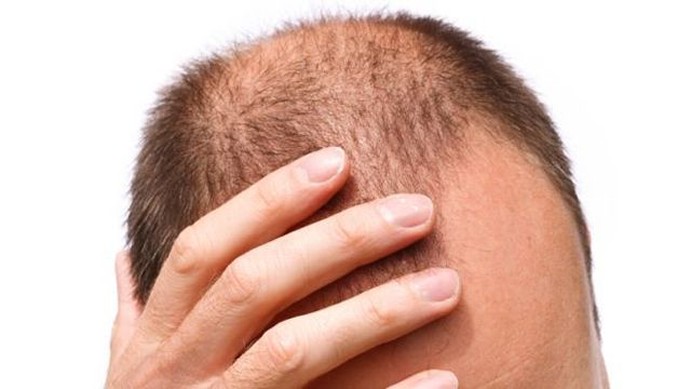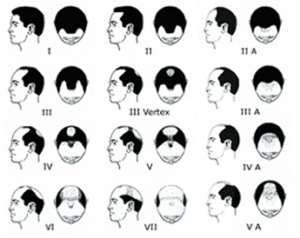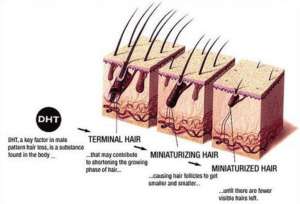
What Causes Hair Loss?
Male/Female Pattern Baldness
 Hair loss is caused by a number of factors, including aging, heredity, and in men, an over-sensitivity of affected hairs to the hormone dihydrotestosterone ‘DHT”. Hair loss begins in some people as early as their teens. According to the American Board of Dermatology, hereditary hair loss affects an estimated 50 million men and 30 million women in the United States. Hair loss can occur in women as early as their 20’s and in men as early as their teens.
Hair loss is caused by a number of factors, including aging, heredity, and in men, an over-sensitivity of affected hairs to the hormone dihydrotestosterone ‘DHT”. Hair loss begins in some people as early as their teens. According to the American Board of Dermatology, hereditary hair loss affects an estimated 50 million men and 30 million women in the United States. Hair loss can occur in women as early as their 20’s and in men as early as their teens.
Genetic predisposition to hereditary hair loss can be inherited from either side of a person’s family tree or from both parents. Hair loss is found in men and women of most ethnicities and nationalities.
By age 50, 50% of both men and women show visible signs of hair loss, with men experiencing 50% hair loss.
Androgenic Alopecia
Androgenic Alopecia is the type of hair loss experienced by most people seeking treatment. In men this condition is often referred to as Male Pattern Baldness and in women it is known as Female Pattern hair loss. The term Androgenic Alopecia is used to describe the genetic predisposition for males and females to experience pattern baldness. Miniaturization is a process by which hair becomes smaller and finer with each growth cycle until finally, it stops growing altogether. A progressive increase in dihydrotestosterone (DHT) is widely accepted as the cause of miniaturization.
Alopecia Areata
 Alopecia Areata (AA) is recurrent and can cause hair loss in any hair-bearing area. Commonly the condition is evidenced by round or oval bald patches on the scalp or in the eyebrows. The hair will normally grow back within a few months. The condition can progress to loss of all scalp hair (alopecia totalis). The cause of Alopecia Areata is unknown but commonly thought to be an autoimmune disorder and can be exacerbated by stress or anxiety. The most common treatment is with topical or injected steroids. The prognosis is good if the Alopecia Areata has been present less than one year. The prognosis is not as good if the disease has been present for longer periods. Hair restoration surgery is not indicated for patients with Alopecia Areata.
Alopecia Areata (AA) is recurrent and can cause hair loss in any hair-bearing area. Commonly the condition is evidenced by round or oval bald patches on the scalp or in the eyebrows. The hair will normally grow back within a few months. The condition can progress to loss of all scalp hair (alopecia totalis). The cause of Alopecia Areata is unknown but commonly thought to be an autoimmune disorder and can be exacerbated by stress or anxiety. The most common treatment is with topical or injected steroids. The prognosis is good if the Alopecia Areata has been present less than one year. The prognosis is not as good if the disease has been present for longer periods. Hair restoration surgery is not indicated for patients with Alopecia Areata.
Scarring Alopecia
Scarring alopecia is hair loss due to scarring and can be attributed to many disorders including injury to the scalp cause by physical trauma, burns, other kinds of surgeries, diseases such as Lupus or shingles, and bacterial infections. Hair replacement surgery can sometimes be indicated in patients with inactive scarring alopecia. If you are suffering from baldness secondary to any of these conditions, contact a dermatologist for a consultation.
Trichotillomania
Trichotillomania refers to habitual, compulsive plucking of hair from the scalp or other hair-bearing areas of the body and in time, can lead to scarring alopecia. The condition is commonly associated with obsessive-compulsive disorder. Hair loss in affected areas can be transient or permanent, depending upon the severity of the condition. Untreated, the condition can lead to scarring alopecia.

